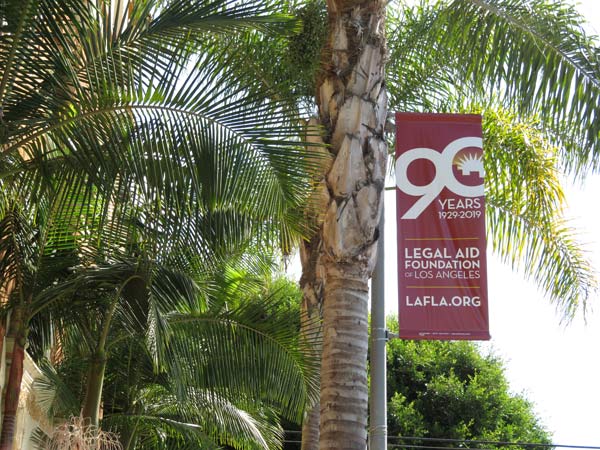MEDIA CONTACT
Sara Williams, (323) 801-7996, sjwilliams@lafla.org
FOR IMMEDIATE RELEASE
March 3, 2020
Tenant Sues Santa Monica Landlord to Stay in
Her Home of 38 Years
Suit alleges source-of-income discrimination and tenant harassment;
landlord refuses to accept rent subsidy
LOS ANGELES – A 72-year-old woman with disabilities who has lived in the same Santa Monica studio for 38 years has filed suit in Los Angeles Superior Court against her landlords. In the suit filed Monday, St. James v. Bills, tenant Zandra St. James charges that her landlord violated state law by refusing to accept her housing choice voucher to offset her monthly rent. As a result, Ms. St. James faces eviction.
Ms. St. James’ apartment is rent-controlled, but with annual incremental increases. The rent has risen to the point that it now demands more than 90 percent of her monthly Social Security disability check. She was awarded a housing choice voucher in 2019 and immediately sought to use the subsidy to help pay her rent for the home she loves. The complaint alleges that the landlord refused to accept the voucher.
“I was very happy to receive my Section 8 voucher after years of waiting,” said Ms. St. James. “I am hopeful that through this process, I will be able to use my voucher so I can afford to live in the home where I have lived for most of my life. I hope my case will help many others who are in similar situations.”
The housing choice voucher program, often referred to as “Section 8,” provides tenant-based rental assistance. Low-income tenants who receive housing choice vouchers pay 30 percent of their monthly income to the landlord for rent. Local housing authorities, which administer the program, pay the remainder directly to the landlord.
“The housing choice voucher program is designed to expand housing opportunities for low-income renters of all kinds,” said Denise McGranahan, Senior Attorney with the Legal Aid Foundation of Los Angeles, which represents Ms. St. James. “It is also critical that low-income seniors like Ms. St. James can age in place. If Ms. St. James’ landlord is able to refuse her voucher, she will be priced out of one of the few below-market units left in Santa Monica. The voucher is her lifeline to stay in her long-term home and to continue to live independently in the community.”
Landlord refusals to accept tenants with government-guaranteed rental payments leave many tenants unable to find affordable housing. Additionally, landlord refusal is often discrimination-by-proxy against racial minorities, who are disproportionately represented among voucher-holders across the country and in California.
To address this issue in the midst of the state’s housing and homelessness crisis, the California Legislature passed SB 329 last year, which prohibits discrimination against tenants based on the use of subsidies like the housing choice voucher. Prior to SB 329, the City of Santa Monica already had a similar local ordinance.
“Protections against discrimination like this are an important tool for addressing our statewide housing crisis,” said Matt Warren, Attorney at the Western Center on Law & Poverty, which also represents Ms. St. James. “Housing choice vouchers are essential for many people with low-incomes to keep a roof over their head, and to stay above water. California in particular cannot afford for landlords to refuse qualified tenants who are able to pay rent using vouchers.”
The complaint alleges that Ms. Bills’ refusal to accept the housing choice voucher is based in part on a desire to force Ms. St. James to leave. Since Ms. James is a long-standing tenant with stabilized rent below the area median rate, the landlords have an incentive to pressure her to leave, which is an eviction that would otherwise not be allowed under Santa Monica’s renter protections. If evicted, it is likely that Ms. St. James will have extreme difficulty locating adequate, stable housing to meet her needs.
The lawsuit names as defendants apartment owner WIB Holdings, Inc. and its principal, Barbara Bills. The City of Santa Monica has also sued Ms. Bills and WIB Holdings for the same discriminatory refusal to accept Ms. St. James’ voucher.
Ms. St. James seeks to remain stably housed, and to ensure that other voucher holders avoid unfair refusals by landlords.
###
About Legal Aid Foundation of Los Angeles
Legal Aid Foundation of Los Angeles (LAFLA) seeks to achieve equal justice for people living in poverty across Greater Los Angeles. LAFLA changes lives through direct representation, systems change and community empowerment. It has five offices in Los Angeles County, along with four Self-Help Legal Access Centers at area courthouses and three domestic violence clinics to aid survivors.
About Western Center on Law & Poverty
Western Center on Law & Poverty fights for justice and system-wide change to secure housing, health care, racial justice and a strong safety net for low-income Californians. Western Center attains real-world, policy solutions for clients through litigation, legislative and policy advocacy, and technical assistance and legal support for the state’s legal aid programs. Western Center is California’s oldest and largest legal services support center.

